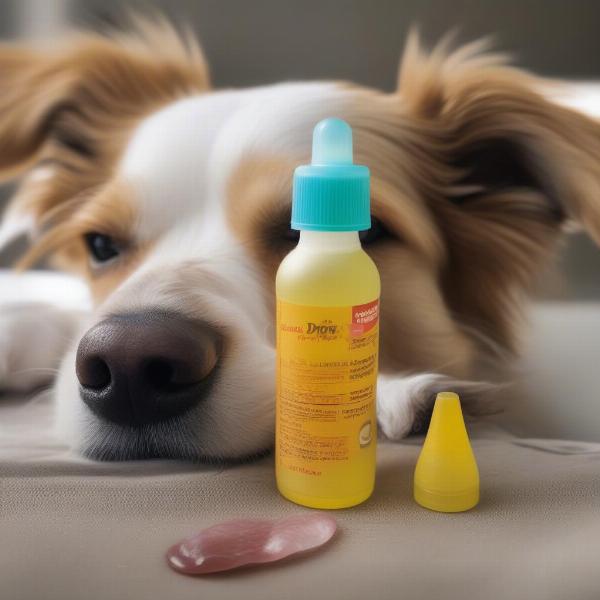Johnson’s ear drops for dogs are a common search term, often indicating an owner’s concern about their canine companion’s ear health. Understanding the different types of ear drops, their proper usage, and potential risks is crucial for effectively managing ear issues in dogs. This guide will delve into everything you need to know about using ear drops for your dog, including when to consult a vet and how to administer them safely.
Understanding Dog Ear Issues
 Johnson's Dog Ear Drops for Ear Infection
Johnson's Dog Ear Drops for Ear Infection
Before reaching for any ear drops, it’s important to understand why your dog might be experiencing ear discomfort. Common ear problems in dogs include ear infections (both bacterial and yeast), ear mites, allergies, and foreign bodies. Each of these conditions requires a different approach, and using the wrong ear drops can worsen the problem. While some Johnson’s products are marketed for human ear care, it’s essential to consult your veterinarian before using any human medication on your dog.
Choosing the Right Ear Drops for Your Dog
It’s crucial to remember that not all ear drops are created equal. The term “Johnson’s ear drops for dogs” is often used generically, but there isn’t a specific product marketed under that name for canine use. Different ear drops contain various active ingredients designed to target specific ear problems. Some common types of ear drops include those containing antibiotics, antifungals, anti-inflammatory agents, and miticides. Your veterinarian can diagnose the underlying cause of your dog’s ear problem and prescribe the appropriate medication. Self-treating your dog with over-the-counter ear drops can be dangerous and may delay proper treatment.
ear drops for dogs yeast infection are specifically formulated for fungal infections. Using the wrong type of drops, like an antibiotic for a yeast infection, will be ineffective.
How to Administer Ear Drops Safely
Once you have the correct ear drops prescribed by your veterinarian, proper administration is essential. Follow these steps:
- Clean your dog’s ear gently with a veterinarian-approved ear cleaner.
- Warm the ear drops to room temperature.
- Hold the ear flap up and gently squeeze the prescribed amount of drops into the ear canal.
- Massage the base of the ear for a few seconds to distribute the medication.
- Prevent your dog from shaking its head immediately after application.
When to Consult a Veterinarian
Any sign of ear discomfort in your dog warrants a veterinary visit. Symptoms such as excessive scratching, head shaking, redness, swelling, discharge, or an unpleasant odor from the ears should not be ignored. Early diagnosis and treatment are key to preventing more serious complications.
dog ear drops should always be used under the guidance of a veterinary professional.
Conclusion
While the term “Johnson’s ear drops for dogs” may lead you to consider over-the-counter solutions, always consult your veterinarian for a proper diagnosis and treatment plan. Using the wrong ear drops can be detrimental to your dog’s health. By working with your vet and following their instructions carefully, you can help your furry friend get relief from ear discomfort and maintain optimal ear health.
FAQ
- Can I use human ear drops on my dog? No, you should never use human ear drops on your dog without consulting a veterinarian. Human medications can have different formulations and concentrations than those intended for dogs and can be harmful.
- What are the signs of an ear infection in dogs? Signs include excessive scratching, head shaking, redness, swelling, discharge, and an unpleasant odor from the ears.
- How often should I clean my dog’s ears? The frequency of ear cleaning depends on the breed and individual dog. Consult your veterinarian for recommendations.
- How can I prevent ear infections in my dog? Regular ear cleaning, proper drying after swimming, and addressing underlying allergies can help prevent ear infections.
- Are there any home remedies for dog ear infections? While some home remedies may provide temporary relief, it’s crucial to consult a veterinarian for a proper diagnosis and treatment plan before attempting any home remedies.
- What if my dog’s ear infection doesn’t clear up with ear drops? If your dog’s ear infection doesn’t improve, contact your veterinarian. They may need to adjust the medication or explore other treatment options.
- Can ear mites cause ear infections in dogs? Yes, ear mites can irritate the ear canal and create an environment conducive to bacterial or yeast infections.
antifungal drops for dogs ears are essential for treating yeast infections, a common culprit in dog ear problems.
About ILM Dog
ILM Dog is your trusted resource for expert advice on all aspects of dog care, from breed selection and puppy care to senior dog health and behavior training. We provide comprehensive, practical information to help you make informed decisions about your dog’s well-being. Our articles are written by experienced dog professionals and cover various topics, including nutrition, grooming, exercise, and product recommendations. For personalized guidance on your dog’s health, training, or nutritional needs, contact our experts at [email protected] or call us at +44 20-3965-8624. We are dedicated to helping you provide the best possible care for your canine companion.